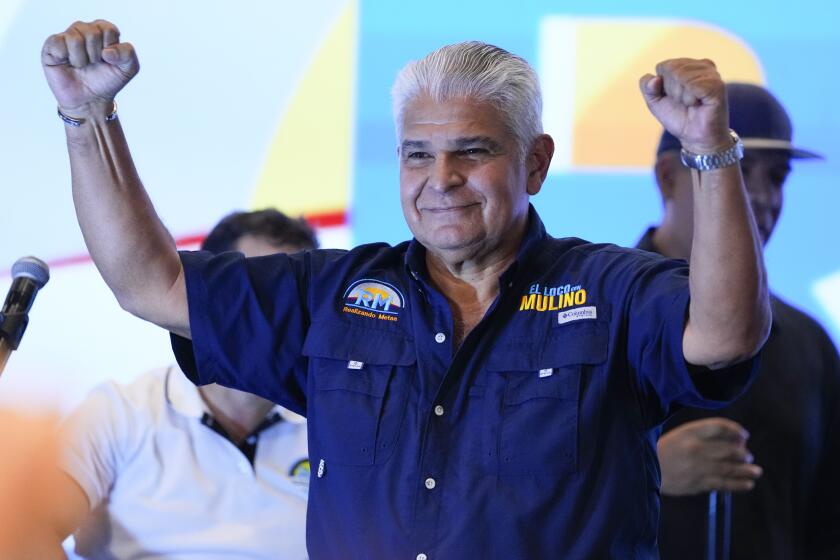Salinas Tries to Build a Life in U.S. : Mexico: When he left the presidency, he was hailed as a visionary economist. Now he’s reviled in his own country.
It was a public ritual of corporate America that he could not avoid. So on April 19, Carlos Salinas de Gortari, the former president of Mexico and now the highest-ranking--and perhaps most elusive--foreign politician taking refuge in the United States, emerged from hiding to attend the annual meeting of Dow Jones & Co. in New York.
He sat quietly in the audience while shareholders rubber-stamped his election to the company’s board of directors, spoke briefly to a dogged Mexican journalist, then disappeared once more.
Such was Salinas’ only public appearance since his dramatic flight from Mexico in March, when he was forced out by his handpicked successor, one step ahead of an angry Mexican public trying to find someone to blame for the nation’s economic implosion.
When he left office last November, he was hailed as the man who finally had started Mexico on the road from the Third World to the First, the visionary economist who had the courage to befriend Washington and seek integration with the giant to the north.
In the process, he had imposed the discipline of the global marketplace on a statist system. Salinas seemed destined for a new life as an international statesman, with the presidency of the new World Trade Organization his for the asking.
All that has now turned to ashes.
Today the 47-year-old Salinas, armed with just a six-month tourist visa that can be extended only by the Immigration and Naturalization Service, is seeking to rebuild a life for himself in the Connecticut suburbs of New York.
And his flight to the United States has brought Mexico’s political turmoil uncomfortably close to home for the Clinton Administration.
The White House, hoping to avoid further controversy in the wake of the U.S. decision to guarantee loans that will help Mexico through its economic crisis, has kept its distance from Salinas since his arrival.
As recently as December, the Administration had been pressuring other nations to accept Salinas as the first leader of the international trade organization.
Now he is a non-person at the White House, just another “private citizen here legally on a six-month visa,” in the words of one Administration official.
But pressure is growing in Mexico for a criminal investigation of Salinas in connection with one of a series of political assassinations that has recently plagued Mexico; this could ultimately force Washington to decide whether he must be sent back to Mexico to confront his accusers.
President Clinton is still battling with the Republican Congress over the future of the U.S. bailout of Mexico. If congressional critics can use the Salinas case to claim that Mexico is in the midst of a period of political retribution and internal bloodletting that threatens the stability of the country, they may be able to win enough support to block the loan guarantees.
Sensitive to the politics of both Washington and Mexico City, U.S. officials are making it clear that they do not want to let Salinas’ fate become a source of friction in Congress or in U.S.-Mexican relations.
“I am convinced that if the Mexican government presented a valid request to grab him, we’d do it without a blink of an eye,” a senior Administration official said. “Mexico would get first-class cooperation.”
U.S. officials point to the quick arrest in March of Mario Ruiz Massieu, Mexico’s former assistant attorney general, as an example of how the United States would respond to a request to arrest Salinas.
Ruiz Massieu was accused of obstruction of justice in the investigation of the September, 1994, assassination of his brother, Francisco Ruiz Massieu, then No. 2 in the ruling Institutional Revolutionary Party, or PRI.
Mario Ruiz Massieu was picked up at Newark International Airport by U.S. officials at the behest of Mexican authorities and is awaiting an extradition hearing.
Salinas’ older brother, Raul, was arrested in Mexico in February in connection with the same assassination. Mexican opposition leaders have been pressuring the government of Ernesto Zedillo to question the former president as well.
The Zedillo government has so far shown little interest in doing so, and Mexican Atty. Gen. Antonio Lozano has said that Salinas is not under investigation.
In fact, Salinas left Mexico at Zedillo’s urging. He flew to the United States after Mexican officials made it clear that he should get out to help reduce political tensions.
Salinas was at least partly to blame for those tensions, having conducted a bizarre, intermittent hunger strike demanding that the new government clear his name.
*
Ultimately, Salinas and the Zedillo administration apparently agreed that the two sides would stop criticizing each other in public if Salinas agreed to go abroad.
Analysts say his brother’s arrest may also have convinced Salinas that he was being set up as the scapegoat for Mexico’s troubles.
“The Zedillo administration took over as perhaps the weakest new Mexican government in several decades, so they tried to throw the blame for the crisis on the previous administration,” observed John Womack, a Mexico expert at Harvard University and a Salinas friend.
Back home, in a nation with a tradition of contempt for former presidents, Salinas is widely reviled.
Some political cartoonists depict the bald, diminutive Salinas as Mickey Mouse; others have shown him boarding a plane toting gold bars or suitcases stuffed with cash. He is the butt of jokes within the PRI, which he once controlled with an iron hand.
T-shirts declare: “We want Salinas back . . . in Almoloya,” the maximum-security prison near the capital where Salinas’ brother awaits trial. Several government sources said they believe that Salinas’ extradition is a real possibility if hard evidence against him emerges.
And Sunday, social activists, union leaders and opposition party members staged a mock trial for Salinas in Mexico City’s main plaza.
*
By all accounts, the former president has severed all but the most personal of ties to his homeland. Salinas’ only direct contact with Mexican officials has been occasional meetings in New York with his former foreign secretary, Manuel Tello, who is now Mexican ambassador to the United Nations.
Aides to Zedillo say he has not spoken with Salinas since the former president’s hunger strike.
“He’s out of the picture completely,” one PRI source said. “I’m sure people are looking after his personal business interests here, but politics or policy? No way.”
With so much political baggage, Salinas may be finding it tough to move smoothly into even a temporary life in the United States.
He has said he is working on a book about Mexico and, as an economist with two doctorates from Harvard, he apparently had hopes of returning to academic life.
In the closing months of his presidency, Harvard’s Kennedy School of Government had been wooing Salinas for a faculty post.
But the controversy in Mexico put an end to those talks, Harvard sources said. And, while Salinas has joined the Dow Jones board--donating his $25,000 director’s fees to a Mexican charity--company officials said he has not been named to any other corporate boards in the United States.
Even his efforts to fend off the controversy surrounding his move have backfired. In mid-March, he granted an interview to the New York Times to insist publicly that he had not been forced out of Mexico and is free to return.
But the interview immediately sparked protest in Mexico because it took place at the U.N. ambassador’s New York residence. Now Tello refuses even to discuss Salinas. “It is too hot,” his spokeswoman said.
Times staff writer Mark Fineman in Mexico City contributed to this report.
More to Read
Start your day right
Sign up for Essential California for news, features and recommendations from the L.A. Times and beyond in your inbox six days a week.
You may occasionally receive promotional content from the Los Angeles Times.






